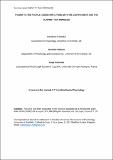Files in this item
Power to the people : disidentification with the government and support for populism
Item metadata
| dc.contributor.author | Urbanska, Karolina | |
| dc.contributor.author | Pehrson, Samuel | |
| dc.contributor.author | Guimond, Serge | |
| dc.date.accessioned | 2022-05-17T23:42:30Z | |
| dc.date.available | 2022-05-17T23:42:30Z | |
| dc.date.issued | 2021-05-18 | |
| dc.identifier | 270408501 | |
| dc.identifier | 5f17c193-a885-43ea-bb69-463073184dd8 | |
| dc.identifier | 85105964041 | |
| dc.identifier | 000651625300004 | |
| dc.identifier.citation | Urbanska , K , Pehrson , S & Guimond , S 2021 , ' Power to the people : disidentification with the government and support for populism ' , Journal of Theoretical Social Psychology , vol. 5 , no. 2 , pp. 79-89 . https://doi.org/10.1002/jts5.77 | en |
| dc.identifier.issn | 2475-0387 | |
| dc.identifier.other | ORCID: /0000-0002-9259-6408/work/94291626 | |
| dc.identifier.uri | https://hdl.handle.net/10023/25396 | |
| dc.description | This work has been supported by the Agence Nationale de la Recherche grant ANR-16-PILO-0002-06 as a part of FLAG-ERA joint transnational call project, FuturICT 2.0. | en |
| dc.description.abstract | Populist attitudes have been shown to predict voting behaviour. These attitudes consist of a belief that everyday citizens are better judges of what is best for their own country than politicians and that the political elites are corrupt. As such, a clear ‘us’ (pure and good everyday citizens) and ‘them’ (the evil political elite) rhetoric is present. In the present research, we propose that identification with the government may predict whether people would vote for, and whether they have voted in the past for, a populist party (either from the political left or the political right). The present research (N = 562), carried out among French citizens, showed that lower government identification related to past voting behaviour, current voting intentions and likelihood to switch from a non-populist to a populist party. Identification with the government was also negatively associated to intention to abstain from voting. Moreover, government identification was a stronger predictor of these voting-related outcomes than the recently developed populist attitudes measures. Unexpectedly, national identification was a not a significant predictor of voting behaviour. In conclusion, the present research suggests that the extent to which citizens identify and feel represented by the government should be considered on par with populist attitudes in understanding support for populist parties. Perceiving that the government does not represent everyday people may be sufficient to abandon support for mainstream (non-populist) political parties. | |
| dc.format.extent | 330347 | |
| dc.language.iso | eng | |
| dc.relation.ispartof | Journal of Theoretical Social Psychology | en |
| dc.subject | Populism | en |
| dc.subject | Populist attitudes | en |
| dc.subject | Voting | en |
| dc.subject | Social identity | en |
| dc.subject | Government | en |
| dc.subject | Non-voters | en |
| dc.subject | BF Psychology | en |
| dc.subject | DAS | en |
| dc.subject.lcc | BF | en |
| dc.title | Power to the people : disidentification with the government and support for populism | en |
| dc.type | Journal article | en |
| dc.contributor.institution | University of St Andrews. School of Psychology and Neuroscience | en |
| dc.identifier.doi | https://doi.org/10.1002/jts5.77 | |
| dc.description.status | Peer reviewed | en |
| dc.date.embargoedUntil | 2022-05-18 | |
| dc.identifier.url | https://doi.org/10.31234/osf.io/h7wbc | en |
This item appears in the following Collection(s)
Items in the St Andrews Research Repository are protected by copyright, with all rights reserved, unless otherwise indicated.

